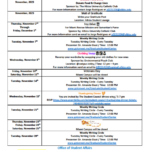Addiction affects individuals from all backgrounds in all facets of life. People with substance use disorders are often stigmatized as shameless, deceptive, self-destructive, selfish, and having poor moral character. Stigma can make people feel shame, hopelessness, and isolation, serving as barriers to treatment. However, people fail to understand that addiction is a treatable brain disease that undermines voluntary control and causes immense suffering to the addicted individual and their loved ones.
Now is a critical time to identify and treat individuals with substance use disorders (SUDs) with empathy, understanding, and evidence-based interventions. In 2020, there were around 93,000 overdose deaths in the U.S. -nearly a 30% jump from the previous year! Society may look down upon those with addictions, but I see people with pain and potential for growth.
A population near and dear to me, I have had people I know to fight the good fight and lose this war. Someone close to me lost their battle with addiction alone in a hotel room by themselves due to an untreated opioid use disorder (OUD). My memories of him will live on forever. It is a gloomy epidemic; however, treatments are available, and recovery is possible. I have witnessed remarkable success stories firsthand working as a behavioral health technician at a treatment center.
Last year, after my acceptance into the PsyD program, I was informed about an opportunity to participate in a Health Resources and Services Administration (HRSA) funded Integrated Opioid Use Disorder and Substance Use Disorder training program directed by Dr. Scott Hyman, a professor at Albizu University. He is also passionate about helping individuals who suffer from addictions. This grant involved a competitive application process where only two students were chosen from my cohort to receive specialized training in substance use disorders prevention and treatment. The program’s overall goal is to improve the workforce of psychologists capable of treating this population. After some rounds of interviewing, I was accepted into this program! Thus far, I have been exposed to addiction experts and specialized training activities that have broadened my field knowledge.
Currently, I am receiving training at Borinquen Medical Centers, a Federally Qualified Health Center, and integrated care setting with programs that focus on OUDs/SUDs and comorbid psychiatric and physical health conditions. My journey is just beginning, but I strive to make a difference in each person’s life as a student clinician and beyond. My goal is to emanate kindness and compassion while instilling hope in my future clients. Recovery is a lifelong process. Those who suffer from addiction need our support and continued advocacy, whether a healthcare professional or a friend.
Adversity allows us an opportunity to develop strength.
Bio: Kimberley Shore is a General Member of the Student Council at Albizu University, Miami Campus. She is committed to fostering a healthy learning community and improving the school in any way that she can. She aims to creatively brainstorm ways to enhance our experience as students here at Albizu University. She is currently pursuing her PsyD in Clinical Psychology.
Further information: If you would like more information about this year’s HRSA OUD/SUD Training Program, please contact Dr. Francisco Sastre or Dr. Scott Hyman (fsastre@sunmail.albizu.edu or shyman@albizu.edu).
The OUD/SUD Training Program is supported by the Health Resources and Services Administration (HRSA) of the U.S. Department of Health and Human Services (HHS) under Grant number 5-D40HP33382 Graduate Psychology Education with an award totaling $118,349. The contents are those of the author(s) and do not necessarily represent the official views of, nor an endorsement, by HRSA, HHS, or the U.S. Government.










